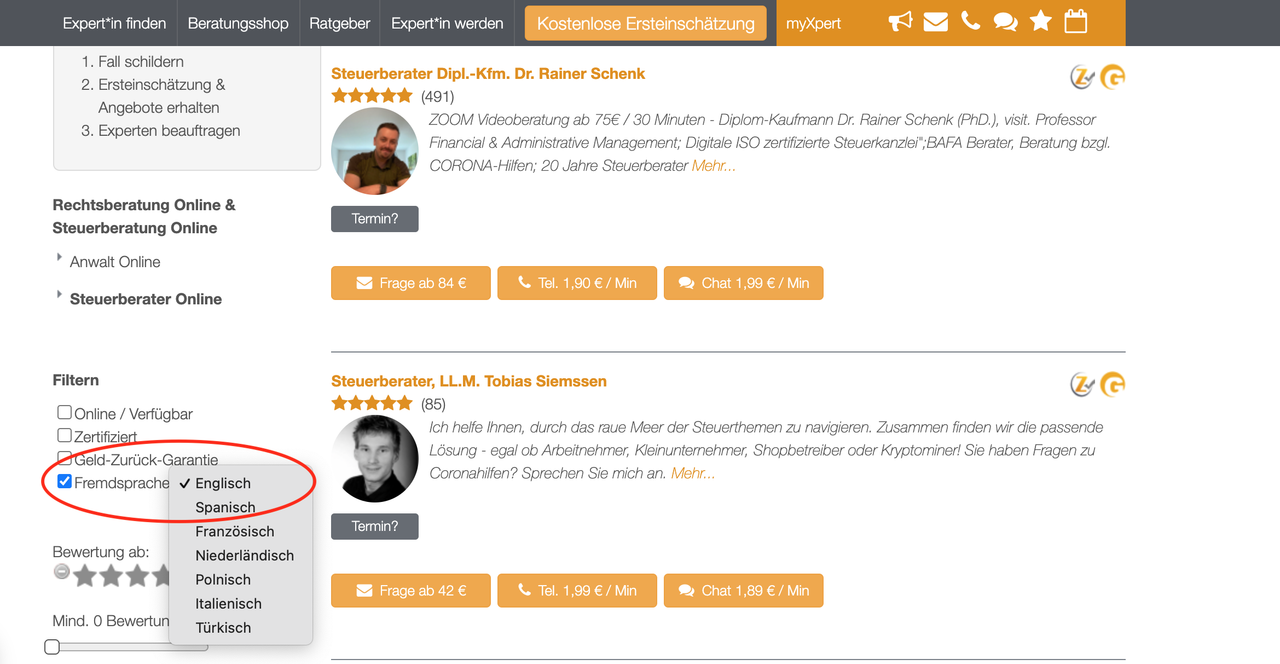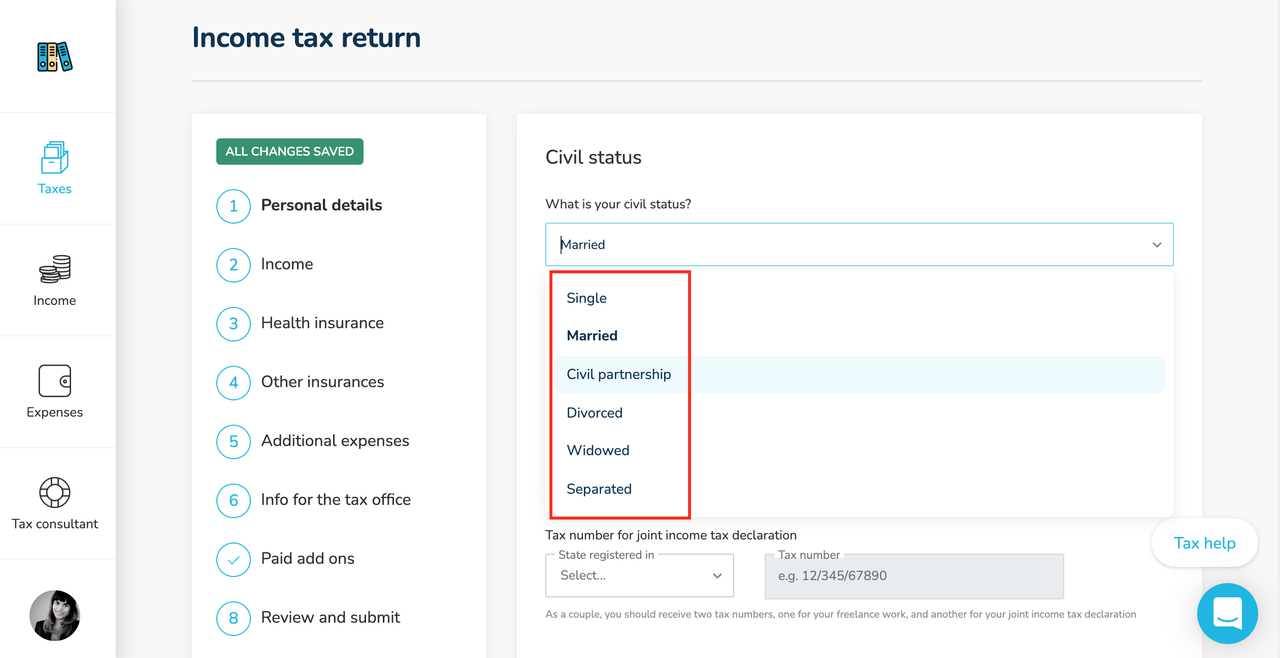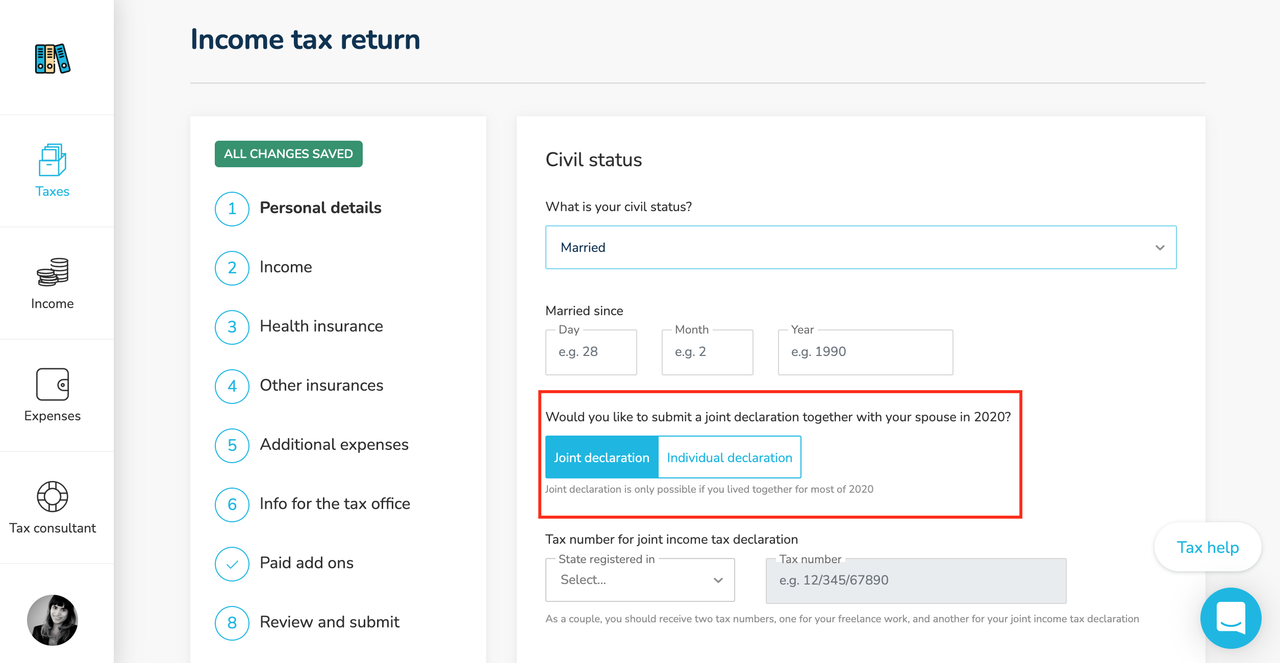
Ehegattensplitting Explained – How to File Joint Taxes in Germany?
Top Takeaways From This Post
Last updated on January 6th, 2023 at 11:38 am
What is Ehegattensplitting in Germany and how can couples file joint taxes here? Learn more about joint tax filing in Germany for married couples or civil partners.
In Germany, married couples and civil partners can choose between individual tax assessment and joint tax assessment. This is known as Ehegattensplitting in the German Income Tax Act (EStG).
But how does it work and is it really beneficial for couples?
Well, actually yes!
There are tremendous tax benefits for married couples in Germany! Single people, on the other hand, are taxed according to the standard tax rate and pay significantly higher taxes.
Dec 2021 Update: Post elections, there have been proposals for abolishing the joint taxes in Germany. The coalition’s proposal is to “merge” tax classes III and V into “tax class IV with factor”. The aim of the proposed system is to tax each partner accurately according to their individual income. The income tax deduction for both partners could be much more accurate and usually, additional income tax payments are avoided in the process. As of the end of 2021, married couples can still file joint taxes using the Ehegattensplitting system.
1) What are the benefits of Ehegattensplitting in Germany?
Ehegattensplitting has a lot of tax advantages, especially when the income of the two partners differs greatly. It’s no wonder that this tax category is financially attractive for many couples in Germany.
Here are the most important features of Ehegattensplitting (joint tax assessment):
- Under joint tax filing in Germany, the income of the spouses/civil partners is determined separately, but then added together and submitted to the tax office as a joint income tax return. Both are considered as one tax-paying unit and receive a joint tax assessment.
- Both partners are jointly liable for the total income tax to be paid. One partner must therefore answer for the tax liability that is attributed to the other.
- With Ehegattensplitting, you can reap tax benefits as a married couple in Germany from day 1 of your marriage. For example, if you get married on 31 December 2021, you and your partner can opt for a joint tax filing in Germany for the entire 2021.
- Ehegattensplitting has great financial advantages only one spouse/partner earns more income than the other. However, it doesn’t make much of a difference if both partners earn the same monthly income.
2) Can same-sex couples also apply for Ehegattensplitting in Germany?
Absolutely!
Ehegattensplitting also applies to registered civil partners (acc. to Federal Constitutional Court, decision of 7 May 2013, ref. 2 BvR 909/06).
In Germany, married couples and same-sex registered civil partners are treated equally by the tax authorities for tax purposes since 2013.
3) What is the eligibility for Ehegattensplitting?
A couple should fulfil the following conditions to be able to file taxes under the Ehegattensplitting category.
3.1) You should have a legal and valid marriage certificate in Germany
Only couples with a valid marriage certificate, whether same-sex or hetero can apply for joint tax filing in Germany. The church wedding alone does not qualify for Ehegattensplitting.
3.2) You should have unlimited tax liability in Germany
Both spouses must be tax residents in Germany. This means they must live there for more than half of the year to be subject to unlimited tax liability.
If one married partner lives abroad, he or she is subject to limited tax liability. However, in some special circumstances, you can apply for an exception for joint tax filing in Germany using Ehegattensplitting.
3.3) You should be living permanently in the same household
Couples must live together in the same household to be able to file a joint tax assessment in Germany. However, this does not mean that the spouses or civil partners must have the same registered address.
German tax law recognises that in some cases, one of the partners may have a different residential address for work-related reasons.
The key here is that Section 26 paragraph 1of EStG specifies that the spouses “do not live separated permanently“.
Related: Cost of Living in Germany for a Couple in 2022
4) When is a joint tax assessment really worthwhile?
As a thumb rule, the greater the difference in incomes of the spouses, the greater the financial advantage of Ehegattensplitting in Germany. Joint tax filing in Germany is particularly lucrative if one partner has a very high income and the other earns very little.
You will notice huge savings in your taxable income if one of the partners is in a high-tax class. Your tax advantage can amount to more than 9,000 euros – in some cases, can even result in five-figure savings.
The table below demonstrates the tax benefits for married couples in Germany with Ehegattensplitting. You can see different variations of incomes of both partners and how the Ehegattensplitting decreases the tax burden according to both incomes.
| Individual tax assessment (basic tax class) | Joint tax assessment (Ehegattensplitting) | Tax benefits | ||||
|---|---|---|---|---|---|---|
| Partner A | Tax A | Partner B | Tax B | Total Taxes | ||
| 60.000 € | 16.063 € | 0 € | 0 € | 16.063 € | 10.182 € | 5.881 € |
| 50.000 € | 11.994 € | 10.000 € | 36 € | 12.030 € | 10.182 € | 1.848 € |
| 40.000 € | 8.333 € | 20.000 € | 2.266 € | 10.599 € | 10.182 € | 417 € |
| 30.000 € | 5.091 € | 30.000 € | 5.091 € | 10.182 € | 10.182 € | 0 € |
Source: Income tax calculator of the BMF, basic and splitting table for 2021
If you want to check your individual income, then use this German tax calculator for married couples and civil partners.
This German tax calculator allows you to calculate income tax even when one or both partners are self-employed. Watch this video tutorial!
5) How is the tax calculated with the Ehegattensplitting?
If you have opted for Ehegattensplitting in Germany, your income tax is calculated according to the splitting method on the basis of Section 26b and section 32a EStG.
In a nutshell: For half of the joint income, the tax is calculated according to the basic table and then doubled. This usually results in lower tax liability for couples than for an individual tax assessment.
The following table provides a comparison of the basic and joint tax rates for different taxable incomes:
| Taxable income | Basic table | Ehegattensplitting table |
| 10.000 € | 36 € | 0 € |
| 20.000 € | 2.266 € | 72 € |
| 30.000 € | 5.091 € | 2.020 € |
| 40.000 € | 8.333 € | 4.532 € |
| 50.000 € | 11.994 € | 7.252 € |
| 60.000 € | 16.063 € | 10.182 € |
| 70.000 € | 20.263 € | 13.320 € |
| 80.000 € | 24.463 € | 16.666 € |
| 90.000 € | 28.663 € | 20.222 € |
Source: Income tax calculator of the BMF, basic and splitting table for 2021
6) How can you apply for Ehegattensplitting in Germany?
Once you get married in Germany, you should apply to change your tax class. You can do this by filling up this two-page form and sending it to your responsible Finanzamt.
In this form, you share tax-related information such as German tax ID, residential address, type of health insurance and pension insurance and of course your newly chosen tax class as a married or registered couple in Germany.
If one of you is self-employed, Finanzamt will issue TWO new tax numbers. One for your freelance activity. the other tax number for joint taxes is a couple in Germany.
Learn more about tax numbers for freelancers in Germany.
7) How can you file a joint tax assessment in Germany?
7.1) Using German online tax filing tools
You can file your own expat taxes in Germany using one of the following English tax filing tools. Some of them cost as little as €35 per tax return.
SteuerGo is an online multilingual tax return software offered by a Berlin-based fintech company. It allows Geman tax noobs to quickly complete and submit their income tax return in Germany – in English German, Polish, Russian, Hungarian and other European languages
SteuerGo costs 34,95 € for one German income tax declaration.
You pay only when you decide to submit your tax return in Germany.
Check out SteuerGo for a free trial.
smartsteuer is another excellent and affordable online German tax return software. It can be used in practically any language, thanks to the integrated Google translations.
smartsteuer is ideally suited for singles, families, trainees, students, pensioners, the self-employed and business people.
smartsteuer costs 34,95 € for FIVE German income tax declarations.
Check out smartsteuer for a free trial.
7.2) Hiring a German tax consultant
If you don’t feel confident enough to file your own joint taxes in Germany, you can always get professional help. Tax consultants cost quite a bit in Germany, however, you can have peace of mind that your German taxes are in good hands.
YourXpert has not only English-speaking tax consultants but also multilingual tax advisors in their directory. You can always select the language that you prefer and contact a tax consultant. Some of their tax consultants also offer 100% online support.
Click here to find an English speaking tax consultant in Germany here.
8) How to file joint taxes as a self-employed person in Germany
If you or your spouse is self-employed as a freelancer or a sole trader in Germany, you can use Ehegattensplitting just like anyone else. Ehegattensplitting can be favourable if the employed partner opts for tax class III and receives a higher net salary.
First, you will file your business-related taxes and declarations as usual for example, your advance tax payments, VAT etc. At the end of the financial year, you will pay income tax on your taxable income according to the Ehegattensplitting tariff.
Sole traders or freelancers in Germany can easily file their own taxes using GetSorted, which is an English online tax filing tool specifically for self-employed people.
When you file your tax declaration using Sorted – first, you will choose the type of civil status in Germany.
After selecting ‘Joint Declaration’ you can go ahead and enter the rest of the information in the form.
Click here to learn more about Sorted
Disclosure: Some of the links contained in this article are affiliate links, meaning we receive a small commission for any sales resulting from these clicks. This has no bearing on the price of the product or service. Thank you for supporting us – we appreciate it!







